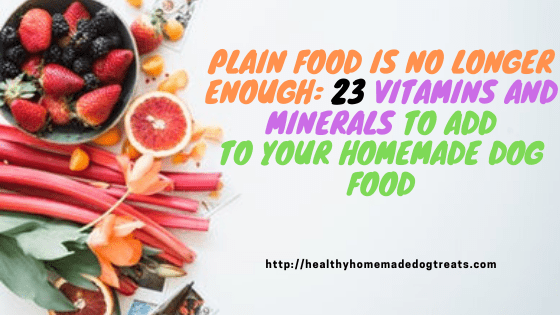Preparing a homemade dog food, treat, or diet is always a simple task but the only challenge is choosing the ingredients to use. If you don’t add the right ingredients, you may end up giving your dog foods that lack certain essential nutrients, which may result in poor health of your dog in the long term.
Nonetheless, with the right information, you can balance your dog’s food by adding formulated vitamins and minerals to ensure that your dog gets the best nutrients that will keep it healthy and happy.
But just what vitamins or minerals do they require? Here is a complete guide on the vitamins and minerals for a healthy dog.
- Vitamins/Mineral supplements
- Is it Mandatory to Add Vitamins And Minerals To Your Homemade Dog Foods?
- Which Vitamin Or Mineral Should I Add To Recipe X?
- 1. Vitamin A
- 2. B Vitamins for Dogs
- 3. Vitamin C
- 4. Vitamin D for Dog
- 5. Vitamin E for Dogs
- 6. Vitamin K for Dogs
- 7. Choline for Dogs
- 8. Calcium & Phosphorus
- 9. Potassium, Sodium & Chloride
- 10. Magnesium
- 11. Sulfur
- 12. Iron
- 13. Zinc
- 14. Iodine
- 15. Copper
- 16. Selenium
- 17. Manganese
- 18. Chromium
- 19. Cobalt
- 20. Other trace minerals include:
- What vitamins and minerals are toxic to dogs?
- Final Thoughts
Vitamins/Mineral supplements
Vitamins refer to organic compounds crucial to sustaining life. Most vitamins are naturally found in food. Dogs require vitamins to grow and maintain their body systems.
Vitamins come in two forms:
- Fat-soluble: Are stored in the fatty tissues and the liver. Include vitamins A, D, E, and K
- Water-soluble: Are eliminated through urine. Include vitamins B and C
You probably know the vitamins humans need which are: Vitamin A, B vitamins, Vitamin C, Vitamin D, Vitamin E, Vitamin K, and Choline. Dogs too need these vitamins, but it’s just that they do require them in different quantities than we do.
The vitamins help their bodies to produce energy, balance fluids, maintain electrolytes, and play a critical role in nerve transmission, especially if taken in the right dosages.
While your dog’s body has the capacity to manufacture its supply of specific types of vitamins, other forms of vitamins need to be supplemented via a well-balanced diet or other sources.
Is it Mandatory to Add Vitamins And Minerals To Your Homemade Dog Foods?

Some dog owners believe that if the dog’s food is factory-manufactured then there is no need to add vitamins and minerals because most of the recipes already contain essential vitamins and minerals. Well, this is not true!
Even the best recipes prepared by the best canine nutritionists may not always supply all the required vitamins and minerals to your dog. A past report by NRC indicated that only 2.5% of commercially prepared dog food recipes provided adequate nutrients.
So, where you get your dog food doesn’t matter as much. Even if they are recommended by your vet, they may not be 100% balanced.
Homemade dog food recipes aren’t balanced either—every recipe may provide varying vitamins and minerals, depending on the ingredients used.
So, whether commercially-prepared or homemade, if your dog food isn’t 100% nutritionally balanced and you don’t bother to add any vitamins or mineral supplements at all, your dog could end up nutritionally deficient.
Which Vitamin Or Mineral Should I Add To Recipe X?
One of the frequent asked questions dog owners ask when we post a new recipe is the vitamin or mineral supplement that can be added to the recipe for optimum health benefits.
Unfortunately, there is no straight answer to this—it all depends on the recipe. Some recipes may provide most of the essential vitamins and minerals that your dog needs. Others will not and it’s quite daunting to tell which is which.
The most important thing to do is to figure out the best supplement to use for a given recipe based on the recipe’s ingredients and your dog’s requirements. In other words, you need to establish the number of nutrients contained in a given nutrient and your dog’s daily nutritional requirements. As long as you have a rough idea of these statistics, there are common vitamins and minerals that you should opt for.
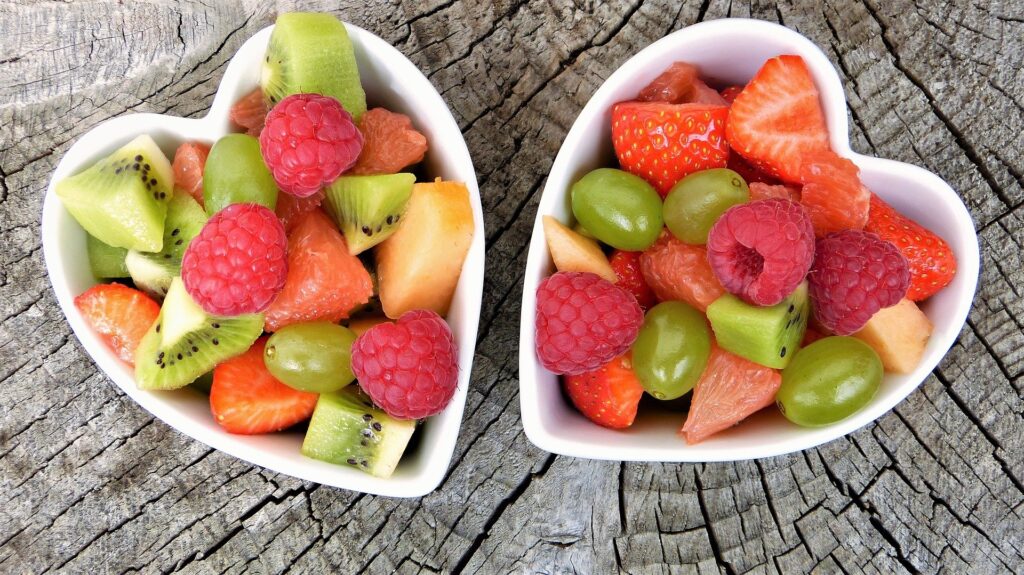
1. Vitamin A
Vitamin A is responsible for good vision. This implies that if your pooch is Vitamin A deficient, it is likely to have vision problems, especially during old age. This fat-soluble vitamin also promotes growth, immune function, cell function, and fetal growth. It also enhances your dog’s coat and skin.
It is abundant in carrots. Other sources of this important vitamin for dogs are fish oil, turnip greens, sweet potato, winter squash, pumpkin, and spinach.
Adding a healthy source of fats such as coconut oil, flax oil, or hemp oil to your dog’s food will help your dog absorb healthy fats (remember vitamin A is fat-soluble) and assist with digestion.
Signs that your dog is missing vitamin A include:
- The dog scratches or licks its fur
- Grows slowly or takes time to reach its full growth potential
- Has poor vision
2. B Vitamins for Dogs
These are a group of essential vitamins that are important for the health of your dog. They include the following:
- Thiamine regulates carbohydrate and energy metabolism and also activates ion channels in the neural tissues.
- B12, riboflavin, and niacin facilitate enzyme function
- Vitamin B6 is responsible for the generation of glucose, nervous system, and red blood cell function, immune response, hormone regulation, and gene activation.
- Folic acid helps in nucleotide and amino acid metabolism as well as in mitochondrial protein synthesis.
- Pantothenic acid promotes energy metabolism.
Common sources of B vitamins are nutritional or brewer yeast, whole grains, green vegetables, nuts, spirulina, dairy products, and beans.
The deficiency of vitamin B2 in dogs is indicated by flaky skin, stunted growth, fainting, fainting, and heart failure.
Deficiency of Niacin (or vitamin B3) is indicated by a black tongue, lack of appetite, inflamed lips and gums, seizures, and bloody diarrhea.
Kidney damage, epilepsy, allergies, asthma, and cancer are some of the health issues that can be attributed to a lack of vitamin B6.
3. Vitamin C
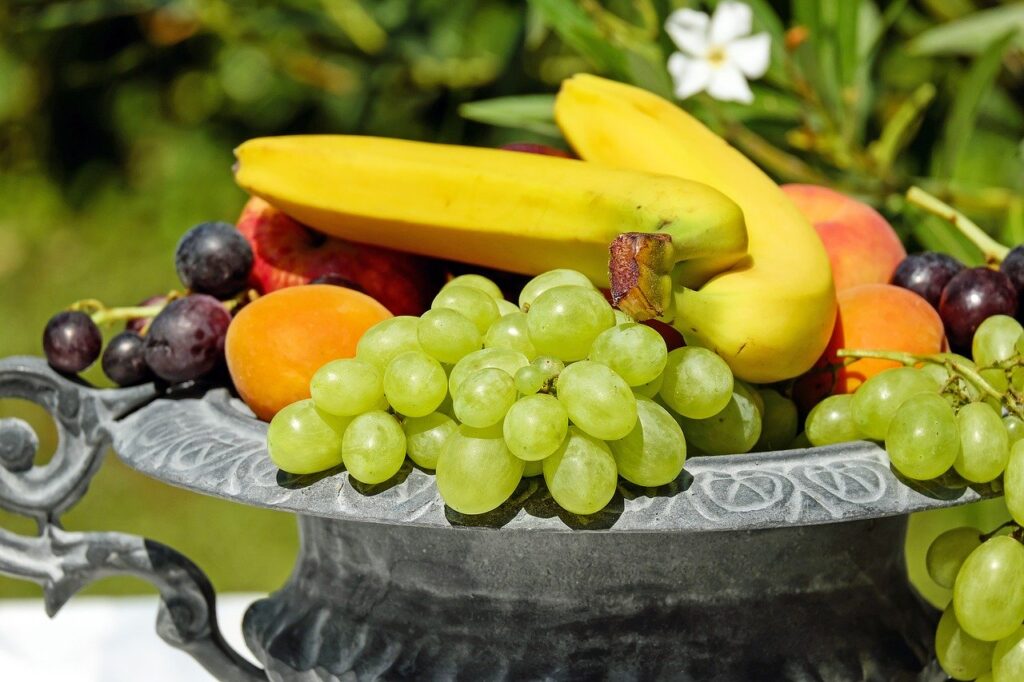
Unlike humans, dogs are known to produce their own vitamin C. This is why some nutritionists believe that it is not necessary to give dogs vitamin C supplements. However, many canine experts have proven that dogs can also benefit from Vitamin C supplements.
For instance, Vitamin C scavenges potentially dangerous free radicals found in the body, making your dog less susceptible to diseases and infections. Adding this supplement to your homemade dog food will, therefore, increase its resistance to common diseases. It will also be able to recover fast from common illnesses or injuries.
As you can guess, the best supplement to give your dog if it has previously been exposed to a contagious disease is vitamin C. It is also good for pregnant and lactating dogs.
It can also reduce inflammation, improve the immune system, and boost the level of antibodies and interferon in your dog’s blood.
It is found in organ meats, vegetables, and fruits.
4. Vitamin D for Dog
Also called the sunshine vitamin, Vitamin D enables the dog’s body to balance minerals such as calcium and phosphorous for healthy bones.
A deficiency of vitamin D means your dog won’t be able to maintain healthy bones and muscles or develop properly. So, your dog is likely to develop bowed legs, swollen joints, and exhibit other rickets-related symptoms.
Sources include fatty fish, marine fish oil, beef, liver, cottage cheese, and egg yolks.
Although this vitamin can significantly enhance your dog’s bones and overall health, too much of it can be harmful to your dog. Association of Feed Control recommends 500IU per kilogram of adult dog food.
5. Vitamin E for Dogs
Vitamin E helps to fight oxidative damage in dogs. Also fat-soluble, it is an essential vitamin for fat metabolism and cell function. It has potent anti-inflammatory properties, making it a great supplement for soothing your dog’s skin and restoring the luster of its overall health.
It is also known to boost the immune system in dogs. It combines with minerals such as Zinc and phosphorous to boost your dog’s ability to fight common illnesses and infections. Inadequate amounts of it can lead to reproductive problems and muscle degeneration.
It is found in leafy green vegetables, wheat germ, whole grains, bran, seeds, liver, and plant oils.
Here are some of the situations when it is highly recommended to add vitamin E to your dog’s diet:
- If your dog’s skin is dry or has rashes, skin lesions or dandruff
- Your dog has previously suffered from a contagious disease
- If your dog is pregnant—to help her deliver healthy bouncing puppies.
- If your dog is infertile
- If your dog has joint issues (vitamin E enhances joint lubrication)
6. Vitamin K for Dogs
Vitamin K comes in two forms: K1 and K2. Generally, the role of vitamin K in dogs is just the same as that in humans. One of the top functions of vitamin K is aiding calcium in strengthening your dog’s teeth and bones.
Vitamin K1 is crucial in activating the ability of your dog’s blood to clot while vitamin K2 regulates the level of calcium.
Adding vitamin K to your dog’s food will help prevent osteoporosis, cardiovascular diseases, arterial calcification, and other blood-related diseases.
Common sources of vitamin K include leafy greens, milk, vegetables, fish, and cabbage.
7. Choline for Dogs
It forms an important part of the phospholipids cell membrane. It promotes healthy liver and brain function.
Common sources of choline include all feeds that contain fat such as egg yolk, glandular meats, legumes, cereals, and oilseed meals.
Common signs of choline deficiency include poor growth, hemorrhagic tissues, fatty liver, perosis, and hypertension.
8. Calcium & Phosphorus

Calcium and Phosphorous help to coagulate blood, nervous system function, and muscle growth. Calcium is also known to mediate a wide range of function in your pet’s body, including:
- Nerve impulse transmission
- Hormone secretion
- Muscle contractions
- Dilation and constriction of blood vessels
- It is also a co-factor for enzymes
Common sources include:
- Calcium: Green beans, cauliflower, broccoli, and tofu
- Phosphorous: Meats, fish, and eggs
Deficiency in these minerals can lead to fractures, bone deformities or weakness. However, over-supplementation in young dogs, especially in large breed dogs, can lead to abnormal growth and development.
9. Potassium, Sodium & Chloride
As the main electrolytes—electrically charged particles or ions—Sodium, Potassium and Chloride control proper balance of fluids in the body’s cells. In particular, they maintain:
- Osmotic balance
- Acid-base balance
- Nerve impulses
- Muscle contractions
They also help in muscle, heart, and nervous system function. Chloride is also important in the secretion of stomach acid.
Imbalances in the amount of chloride or sodium can lead to dehydration, fatigue, hair loss, and even paralysis.
Deficiencies of potassium can lead to vomiting, diarrhea, and the aforementioned problems caused by sodium/chloride deficiencies.
Common sources of these minerals include whole grains, fruits, fish, meats, sweet potatoes, tomatoes, beans, and vegetables.
10. Magnesium
Magnesium is a component of enzymes, bones, and intracellular fluids. It helps in bone and acid development, influences neuromuscular transmission, and aids calcium absorption.
It is found in whole grains, nuts, bone meal, wheat bran, molasses, fish, beans, and leafy vegetables.
11. Sulfur
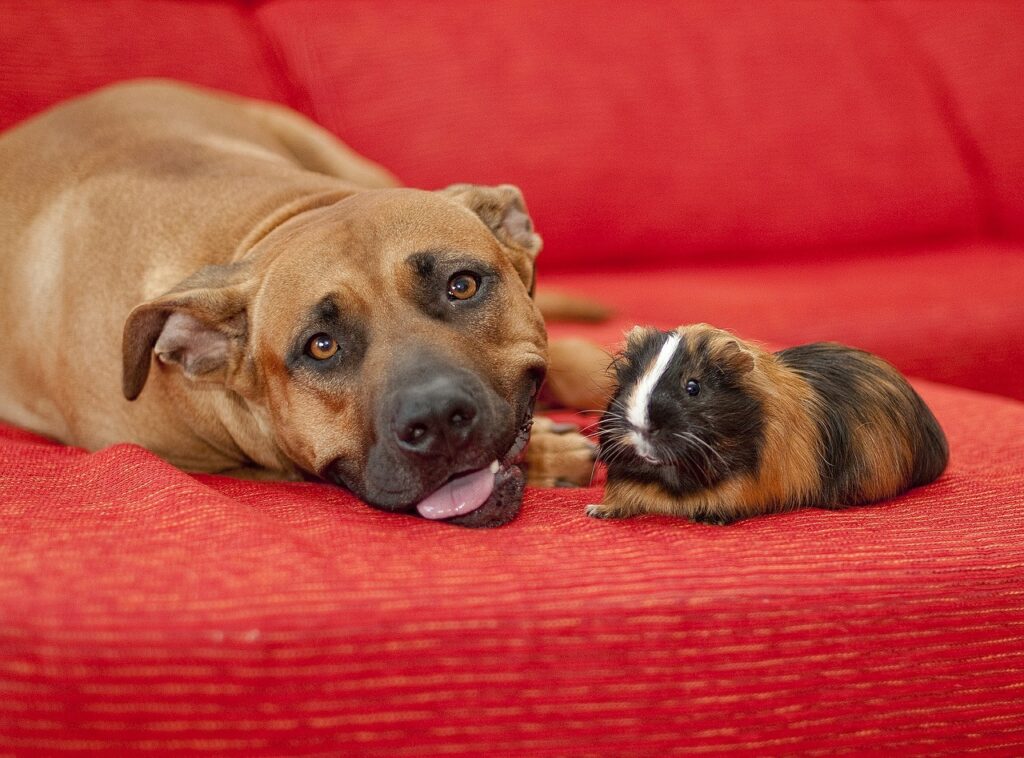
This is responsible for beautiful hair, skin, and nails. It also helps in wound healing and detoxifies your pet’s body.
Without adequate amounts of sulfur, your dog will develop a wide range of skin conditions.
It is abundantly found in fish, molasses, meat, and eggs.
12. Iron
Iron is tasked with oxygenating red blood cells, production of energy, and strengthening of the immune system.
It is found in poultry, legumes, red meats, organ meats (such as liver), and fish.
13. Zinc
As an activator or constituent of more than 200 enzymes in your pert’s body, Zinc is involved in a wide range of physiological functions, including boosting the immune system, enhancing healthy skin and hair, and aiding the digestion of proteins.
Common dietary sources include pork, liver, lamb meat, eggs, and brewer’s yeast.
14. Iodine
It produces thyroid hormone that’s important for metabolism. It is found abundantly in kelp, dairy, and seafood.
15. Copper
Copper enhances bone growth and promotes the use of iron. It is also needed for normal pigmentation of your dog’s skin and hair as well as for bone growth and maintenance.
Common sources include seeds, legumes, whole grains, and seafood
16. Selenium
Selenium is an essential component of the Gluthathione peroxidase—a naturally occurring antioxidant. When paired with vitamin E, Selenium boosts the immune system in dogs.
Common sources include meat, vegetables, brown rice, and meat.
17. Manganese

Manganese is needed for thyroid hormone production and bone growth. It also aids the body in utilizing certain vitamins, including vitamins B1, C, E, and biotin.
Common dietary sources include eggs, chicken, rabbit, pumpkin, and spinach.
18. Chromium
Chromium is needed for carbohydrate and lipid metabolism. Deficiency of chromium causes insulin resistance.
Common sources include vegetable oils, lean meat, and brewers yeast.
19. Cobalt
Cobalt boosts the hypoglycemic power of insulin. Common dietary sources include fruits, kidney, liver, and vegetables.
20. Other trace minerals include:
- Molybdenum (abundant in organ meats, cereals, and legumes)
- Silicon (found in beans, peas, cereals, and vegetables)
- Fluorine (available in water)
What vitamins and minerals are toxic to dogs?

While dogs need the above-highlighted vitamins and minerals for better nutrition, strong bones, and overall good health, some can be toxic, especially when taken in excess quantities. And some are simply toxic regardless of the quantities that you give your dog.
Here are some of the vitamins and minerals that can harm your dog when given in large quantities:
- Vitamin D: While the right quantity of Vitamin D is actually beneficial for dogs, too much of it is quite the opposite. Increased vitamin D has been linked to reduced appetite in dogs. It can also cause harm to their bones and atrophy to their muscles. Additionally, when ingested in toxic amounts, vitamin D can lead to increased calcium levels in a dog’s body causing organ damage and failure including the heart and kidneys.
- Calcium: As highlighted above, calcium promotes strong bones and teeth in pets. However, if you give your carnivore too much, you are risking organ damage and even worse, skeletal tissue problems. This is especially true for large puppies.
- Iron: Iron, in excessive amounts, can result in severe stomach upsets in most mutt breeds. In the worst scenario, it can also lead to organ damage, albeit rarely.
- 5-hydroxytryptophan (5-HTP): According to WebMD, 5-HTP can affect appetite, sleep, sexual behavior, pain sensation, and body temperature in dogs. It is actually used to avert the symptoms in insomnia, depression, and obesity in humans and dogs alike. Sadly, if your dog consumes a little more than the required amount, they may end up with serotonin syndrome characterized by high blood pressure, heart rate, body temperature, seizures, and tremor.
- Vitamin A: Vitamin A is also on the list of poisonous vitamins when given to pets in large quantities. Some of the symptoms of overdose include constipation, nausea, diarrhea, convulsions, and spine/joint stiffness. In rare circumstances, an overdose will result in paralysis and death.
- Xylitol: Xylitol is a form of sugar alcohol usually found in sugar-free chewing gums, mints, candies, among others. In a bid to discourage consumption of processed sugar in their dogs, most dog owners prefer adding xylitol in their pet food. If you fit the description, watch out for excessive amounts since it can lead to low blood pressure, seizures, weakness, blood in the stool, and loss of control in movements.
- Alpha-lipoic acid (ALA): Leading antioxidants found in dog supplements in the market today contain alpha-lipoic acid (ALA). It is harmless for the most part. However, if your dog ingests a tad bit too much, they may run the risk of low blood pressure and/or liver damage.
- Coffee, Tea, Coffee Extracts, Tea Extracts, And Guarana: Coffee, tea, and guarana may be good for your body but these are best kept away from pets. This is because they can cause overstimulation that in turn leads to increased body temperature, seizures, body temperature, and tremors.
- Joint Supplements: While the right quantities of joint supplements are effective for promoting better joint health, excessive amounts are only detrimental. To be safe, steer clear from joint supplements containing chondroitin, glucosamine, and methylsulfonylmethane (MSM) as these can cause stomach upsets and liver damage.
- Protein Powders: If you take drink supplements such as protein powder products, you might want to ensure that they don’t have xylitol before giving them to your dog. Apart from causing liver damage and low blood pressure in canines, protein powders may contain chocolate and cocoa powder. These have been shown to cause severe stomach upsets and a wide range of symptoms equivalent to those of caffeine.
- Human vitamin and mineral supplements: While human vitamins and minerals are good for you, they are certainly toxic for your pooch. From causing organ failures and increased heart rate to death, human vitamins and minerals are best left for people and not dogs.
Final Thoughts
Our pets require vitamins and minerals as part of their diets just as we do. As highlighted above, vitamins and minerals strengthen their bones and teeth, keep their skin and coat healthy, and give the energy boost that they need to function among other health benefits. When making homemade dog foods, it is important to ensure that your dog gets sufficient quantities of these important nutrients to make him/her healthy and happy.
Most importantly, while vitamins and minerals are essential for the health of a canine, the trick is in knowing the right amount. Going overboard will only cause more harm than good. Additionally, some vitamins and minerals you perceive as good for your pup are simply toxic. If your dog accidentally ingests a toxic substance, consult your vet immediately. Else, keep all toxic vitamins and minerals away from your furry friend.
Enjoyed the post? Pin it and Spread the love
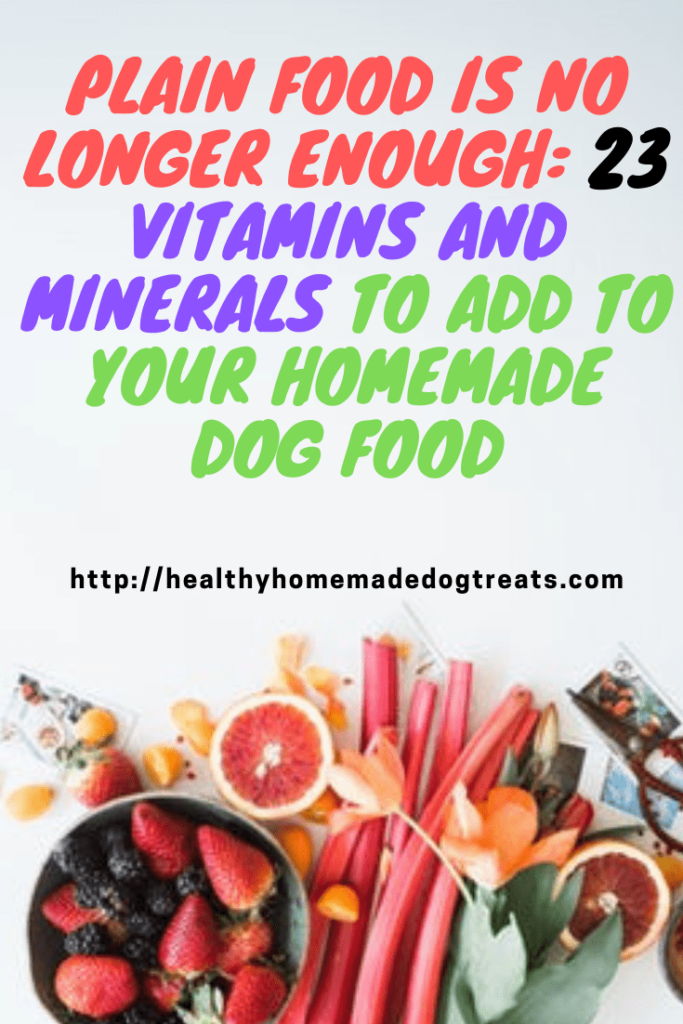
As an Amazon Associate, we may receive a small commission from qualifying purchases but at no extra cost to you. Learn more. Amazon and the Amazon logo are trademarks of Amazon.com, Inc, or its affiliates.

